We've simplified what can be a very complex process. If you still have questions that you can't find the answer to here, please contact us and we'll do our best to get you the answer to your question.
Marshall Auto Body has been working with aluminum for over 25 years. With a background in light aircraft refinishing and sub assembly repairs as well as aluminum sheet metal work, we are well positioned and experienced in working with light weight automotive aluminum body panels and structure.
Today, we use the same Fronius cold metal transfer welder that Tesla's are built with and have over 200 hours of factory training in aluminum structural/mechanical and welding at Tesla's
Fremont, CA facility.
We do not report any information to CARFax!
Reporting to CARFax is not mandatory and the majority of agencies and businesses do not report any records to Carfax at all.
• Do not use a machine polisher unless you use exactly the right pad, polish, and technique. This will cause squiggly swirl marks on dark colors that will look awful in the sunlight.
• Use touch less car washes.
• If you wash your own car, rinse thoroughly before touching the surface. Wash with a soft clean wash mitt. Any dirt between the paint and your mitt will scratch the finish.
• Use a “Water Blade” Squeegee and MicroFiber during cloth (available from us) for drying your car. Micro fiber drying cloths absorb more water, leave virtually no streaks or water spots. Combined, these 2 products are much faster than the conventional chamois and not induce fine scratches like other synthetic drying cloths.
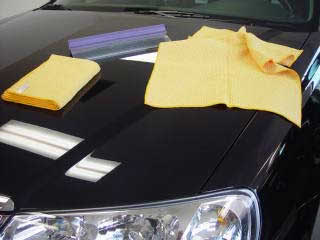
Do not use rubbing compound on your car’s finish. If you have a blemish that wax will not remove, you can purchase material from us that are aggressive enough to polish out defects but will not dull the finish unlike compound sold at auto parts stores.
Wax your car at least 3 times per year! We recommend using Carnauba Wet Wax. It is easy to apply and comes off easily. The Carnauba Wet Wax leaves a showroom finish on new or older painted finishes. This polish will restore color and gloss to lightly oxidized finishes as well as pre-cleaned surfaces. Also eliminates streaks and haze. Contains carnauba wax and detergent resistant polymers for a 'wet look' shine.
Repair duration (or “cycle time”) depends upon insurance approval to proceed, procuring parts, and performing the actual labor required to repair.
The Insurance Company approval to begin any repair will generally take between 1 to 3 days. Because we have insurance claims specialists on site to assist you, we follow up daily with your insurance company to make sure the claim keeps moving so you don’t have to.
Direct Repair Programs have little or no wait! Currently we are a Direct Repair facility for over 25 insurance companies. Procuring parts can be as quick as the same day, but usually takes from 1 to 3 days depending upon the source of the parts and the brand of car.
The labor to perform repairs is estimated in terms of hours. Your file handler will give you an estimate of how long approval, parts and repairs will take. Our average repair cycle time is almost half of the industry average. If you are getting an OEM bumper cover replaced for example, we will pre-paint the part and install it while you wait rather than schedule you to leave the car for 2 days like other shops.
Most repairs take 2 to 5 days. Vehicles that are towed in require 1-1/2 to 2 weeks once approval and parts are secured.
Our outstanding relationship with the insurance industry allows us to keep moving where others have to stop and wait for additional damages (supplements) to be verified and approved by adjusters.
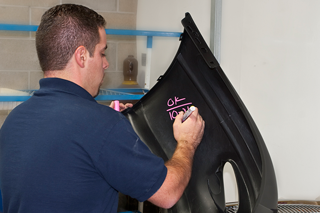
Now would be an excellent time to have any additional repairs done to your car. Having additional work done eliminates the need to be without your car again in the future. Additional repairs often cost less since we may already be doing paintwork or disassembly in the same area.
Paintless Dent Repair, spot blending, glass work, and repairs of other non-accident related damages can be done on a separate bill from the insurance claim and at the same time as the collision work saving you time and money!
While your car is down, talk to our staff, you may want to consider some of the other services we offer.
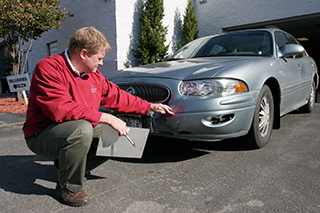
1. Select a repair facility based solely upon whom you feel comfortable entrusting the vehicle repair and billing process. Ignore insurance company pressure to direct you to a specific repair facility if it is not where you feel most comfortable having your problems resolved. A well-organized, knowledgeable organization will access the appropriate insurance people and ensure they take appropriate actions in a timely manner to facilitate a hassle free experience for you, regardless of which insurance company is paying the bill.
2. Never drive a car that could be unsafe because of damages. Call us at 262-549-4300 and we will tow your vehicle to our facility.
3. Insurance companies may want you to visit their drive-in claims center before having your car repaired. You can do this, or you may leave your car at our shop and ask that the insurance company inspect the car here.
4. There is no law requiring you to obtain more than one estimate or appraisal.
5. Differences in repair estimates are common. Reasons range from differing opinion regarding repair methods, overlooked items or in some rare cases, unscrupulous sales tactics. If you're not sure why one estimate is different from another, please ask, we will explain each estimate in detail so you will understand and make a decision that is best for you.
6. Only consider a shop that is well equipped and demonstrates considerable commitment to training and certification. I-Car and ASE are the most prestigious.
7. Many insurance companies only pay for aftermarket or used parts on their initial estimate. Barely any of them will refuse to pay to replace a part that is substandard. A professional repair facility will evaluate the quality of non-OEM parts early in the repair process and reject them if they are substandard. Provided with proper documentation, almost all insurance companies will then pay for the use of OEM parts. Choosing the wrong shop can result in a failure to go through these efforts or excuses that you would not realize as invalid.
8. Make sure the body shop offers a lifetime warranty. If not, don’t even bother getting an estimate.
Marshall Auto Body Paintless Dent Repair (PDR) is an exciting and innovative method for repairing minor dents, dings and hail damage. PDR, by definition, is auto body repair that removes minor dents and dings by using specialized tools that have been specifically designed to manipulate and flex the backside of the metal and remove smaller dents without the necessity of sanding, priming and painting.
Simply put, PDR is a way of removing dents from automobiles without THE COST OF REPAINTING.
Please ask out file handlers about estimating the costs of removing dings and dents from around your car while it is in for other services. Costs start at $85.00 for the first dent and $15-$20 for each additional dent. The cost is determined by the actual size of the dents.
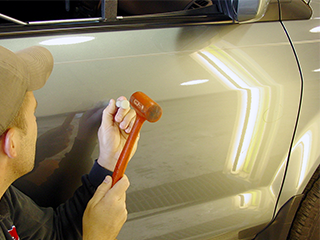
It's more than just getting a low price. It's the assurance that your car is being repaired in a modern shop with state-of-the art equipment. It's knowing that certified experts who take pride in their workmanship are servicing your car. In short, it's the peace of mind you get at Marshall Auto Body, knowing that your car is being repaired the right way, at the right price!
Marshall Auto Body is pleased to have the opportunity to service your vehicle. We will make every effort to have it repaired correctly in the shortest time frame possible. If you have any other questions that aren't answered on this web page, we will be happy to answer them for you. We are dedicated to serving you at all times.

We offer a Lifetime Written Warranty with every repair!
We want you to have peace of mind for as long as you own your vehicle. If you ever experience a problem with our workmanship or materials let us know right away. We will make the necessary repairs or adjustments with as little inconvenience to you as possible. We'll also honor the warranties of any parts we have used. So other than normal wear and corrosion, we have you covered.
Insurance companies rates are usually based on losses and the Insurance Company will not allow the insured to profit or "better" from the loss.
The betterment can reduce the amount of the insurance payment toward your claim. If your older vehicle is repaired with brand-new parts, your insurer may argue that the repairs have actually enhanced the car’s value and therefore they can legitimately reduce your claim by the difference between a used part and a new one. The insurance company will usually determine the appropriate replacement value and the owner’s contribution towards the 'betterment' will make up the difference in the replacement cost.
If you have additional betterment questions, contact your insurance agent and they will be happy to explain this further.
Depending upon the cost of repairs, some insurance companies will pay directly off of an estimate we write, while others assign their own appraisers to evaluate the damages and write an initial estimate of their own. Whenever an insurance company elects to have their own representative create an estimate for repairs, we need to have a copy in order to accurately inform them of any supplemental charges that may come up. Since the initial check for repairs (written by the insurance company) comes from their initial estimate, a breakdown of what their representative saw and already paid for is critical in order to handle any supplemental billing for you.
Don’t forget that where you have your car repaired is your choice and you are protected by law in the State of Wisconsin from having to obtain multiple estimates for the paying party, should you decide it is a waste of your time. Some unscrupulous companies may deploy questionable tactics in an effort to make you “think” you have to get multiple estimates in order for them to pay your claim, however the "Wisconsin Motorists bill of rights" clearly states that you do not.
While most other collision repair shops require you to provide them with the insurance estimate, or get involved with the process of getting reimbursed by the insurance company, we can take care of all of that for you. We know who to call and what to ask to get the answers, and trigger the processes necessary to get your car back on the road as efficiently as possible. All we need is your insurance claim number and we can usually take care of the rest.
An auto estimate is an approximation of the repair costs based upon the visible damages, current part prices, and the estimator’s opinion regarding the time it will take to perform certain repair operations.
Due to more and more of the cars components being shrouded in plastic and assembled more compactly, The full extent of the damages cannot be seen without disassembly, which would often render the vehicle un-drivable. For this reason, it is important to realize that the estimate may not include all that is necessary to complete the repair properly
In order to ensure that billing be as accurate as possible, our file handlers, as well as insurance damage appraisers, estimate only what they can clearly see needs to be done, rather than guessing or including some “contingency costs”. Any suspect items are left as “open” items on the initial estimate, and will be repaired and paid for later on the supplement.
If you find yourself in a situation where someone hit you and wants to make a payment off of an estimate, talk to one of our file handlers and we will explain how to best approach this situation.
When do I need the estimate from my insurance company?
Depending upon the cost of repairs, some insurance companies will pay directly off of an estimate we write, while others assign their own appraisers to evaluate the damages and write an initial estimate of their own.
Whenever an insurance company elects to have their own representative create an estimate for repairs, we need to have a copy in order to accurately inform them of any supplemental charges that may come up. Since the initial check for repairs (written by the insurance company) comes from their initial estimate, a breakdown of what their representative saw and already paid for is critical in order to handle any supplemental billing for you.
Don’t forget that where you have your car repaired is your choice and you are protected by law in Wisconsin From having to obtain multiple estimates for the paying party, should you decide it is a waste of your time. Some unscrupulous companies may deploy questionable tactics in an effort to make you “think” you have to get multiple estimates in order for them to pay your claim, however the "Wisconsin Motorists Bill of Rights" clearly states that you do not.
While most other collision repair shops require you to provide them with the insurance estimate, or get involved with the process of getting reimbursed by the insurance company, we can take care of all of that for you. We know who to call and what to ask to get the answers, and trigger the processes necessary to get your car back on the road as efficiently as possible. All we need is your insurance claim number and we can usually take care of the rest.
The convenience of 'Direct Repair' Insurance Programs:
• A DRP (Direct Repair Program) is an arrangement between Marshall Auto Body and your insurance company. We take care of gathering and transmitting the physical damage assessment information such as photos of the damage and repair costs, as well as explaining the specific policies regarding parts, billing, and claims handling for the Insurance Company. In exchange, we are able to begin repairs faster and complete repairs quicker with a higher quality than other shops that must wait for the insurance representative to get back to them and make the decisions.
DRP programs afford higher levels of service, convenience, and warranty. This allows us to make the best decisions about the parts and procedures used in the repair.
• Decisions regarding quality and timeliness of repair are made by us which avoids delays or waiting for appraisers and adjusters to approve what needs to be done.
• Supplemental Billing is handled directly. This eliminates you having to pay for additional charges upon delivery and waiting to be reimbursed by the insurance company later.
• Because of our high standards and certifications, most Direct Repair Programs match our lifetime warranty with one of their own.
Other than filing the initial claim with your insurance company and giving us some basic information like your claim number along with the claim representative name and phone number, we can take care of the rest!
• While the quality of workmanship is guaranteed, the initial price and days to repair are not. We feel it is important for you to be aware of circumstances requiring scheduling revision such as additional damage found after teardown, along with acquiring additional parts necessary for repair.
• CAR RENTAL – We can arrange for a vehicle to be here for you at the time you drop off your car. Billing is setup directly between the rental agency and yourself. We do our best to arrange the vehicle of your choice however rental agencies make no guarantees as to the model of car provided.
There are a few critical items necessary to rent a car:
• A valid drivers license
• Credit card
• Claim number if insurance is paying for the rental.
• Rental agencies charge for gas so remember to replace the fuel you use.
The claim number is the unique identifier generated by the insurance company with all information about your claim.
When you notify an insurance company of an accident, a number of things will happen. The insurance company will begin by taking a statement from you about what happened, collect information about physical property damage and or injuries, and assign a claim number to the event which will forever be used to access records and correspondence about the claim. Without the claim number, there is no claim formally set up and recognized by the insurance company, and therefore no likelihood of getting reimbursed for collision damage repairs.
Everyone here at Marshall Auto Body will help you as much as possible with all facets of your car repair including the handling of the claim payment. Once a claim number exists, we know that you have provided the necessary information to the insurance company and that a claim file exists. After you notify your insurance company that we will be repairing your car, we can take care of the rest. We will maintain contact and communication throughout the repair so you don't have to. Without you first contacting the insurance company and thereby generating the claim number we will not be able to help.
If the other parties insurance is responsible for paying for your damages, it is imperative that the other person contacts their insurance company to initiate this process. You will most likely also have to give them a statement as well. Getting us that companies name and claim number will allow us to take over the administrative process by calling, faxing, e-mailing, etc. to get your damaged repairs authorized and paid.
Ultimately you, as the vehicle owner and our customer, are responsible for authorizing repairs, and paying the bill when the repair is complete.
When an insurance company is involved, we will communicate costs and repair requirements directly to them on your behalf so you don’t waste time and become aggravated with the tedious process.
Some insurance companies will pay our shop directly for repairs, others must pay you because of the way the policy is written, and then you in turn are responsible for paying us for the work. Most of the time, this involves merely endorsing the insurance check over to us when the repairs are complete. Our file handlers will explain, whatever causes less involvement and effort for you.
If you are the insured, you will be responsible for paying the deductible amount that is determined on your insurance policy. If you are not certain of your deductible amount, your agent can help you with that. If you are the claimant on an insurance claim, the other insurance company usually will cover the entire cost of the repair.
Contact your agent if you have any insurance policy questions.
If you have been hit by someone who wishes to pay for your repairs out of pocket rather than using their insurance, it is important to remember the following:
Notify the shop of your situation so you can obtain as thorough an appraisal as possible.
Present that estimate only to the paying party.
Although individuals, as well as some insurance companies, will tell you to obtain multiple estimates, you have no legal obligation to do so, and submitting multiple quotes leads to the following complications:
- When the party paying for damages is not the party who owns the car, they always select the lower of the 2 prices without regard for what those differences might be. You, the vehicle owner have other concerns besides the direct cost of repairs.
- Auto Body shops, like most other service businesses, proclaim to differentiate themselves on "quality". Quality can be defined in many different ways.
- At Marshall Auto Body, quality is defined as an invisible repair, warranted for as long as you own the vehicle, at a price that satisfies your economic objectives in restoring the car to pre-accident condition.
Let the person estimating your damages know that another individual will be paying for your damages. You may choose to get a few different opinions before submitting the repair estimate of your choice to the party paying for your loss.
Even relatively minor damages can produce estimates varying widely in costs.
- Depending whether the parts are repaired or replaced.
- If replacement parts are OEM, Used, or Aftermarket.
- Whether trim is removed so paint will adhere permanently, or if the vehicle is masked with tape will have an effect upon repair cost.
The age of your car, how long you plan to keep it, how important some of the aforementioned repair options are to you, all need to be properly addressed by the repair shop of your choice to ensure that you get what you want as the vehicle owner.
Only when the repair shop has appropriately explained options available to you, and you both have a mutual understanding of what "quality" level will be implemented upon your repair, do you actually have an estimate that will accurately reflect the cost of repairing your car to a level with which you are satisfied.
Once you have the estimate from the facility with whom you have decided will repair your car:
- Submit only that estimate to the paying party (whether an individual, a corporation or insurance company).
- Should they object or are not able to come to an agreement.
- Submit a claim with your own Insurance Company.
--
Your Insurance Company will honor the repair facility of your choice.
--
They will initiate a subrogation proceeding in attempt to recover monies owed by the party at fault.
-They will have to pay your insurance company back.
- At this point, most difficult crashers turn the claim into their own insurance (if they have insurance), and their company will take over the claim and pick-up your rental cost. The repair ends up the same in the end for you anyway.
- Understand that the estimate is just that. Your estimator will let you know where hidden costs may arise, especially if some of the damage cannot be seen without disassembling the car to inspect it.
If you need alternative transportation while your car is being fixed, we will make the necessary arrangements for you. Your estimator will provide you with a cost per day for a loaner vehicle to add to the amount they will owe you.
All payments should be made to you. Often times the person who inflicted the damages wishes to pay the repair facility directly. This is fine, however, you as the car owner are ultimately responsible for payment since you own the vehicle, you authorize repairs, and you ultimately need to be sure that payment is made good for the work done to your car.
We recommend that if the other party wants to pay the shop that they utilize a credit card rather than a check as verification of funds. A credit card allows the paying party to easily cover supplemental charges should they arise once repairs are underway. If there are ever any questions regarding this scenario or any other concerns, please don’t hesitate to contact us with details so we can provide you with the best.
Replacement parts for your car come from three different sources:
• OEM
• LKQ (Used or Recycled)
• Salvaged
• Aftermarket or Reconditioned
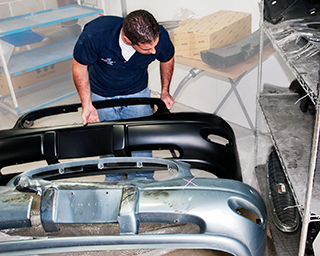
OEM parts are distributed through local dealers. Because of the distribution chain established by automobile manufacturers, parts are sold through car dealers, not shipped from the manufacturing plants directly to the end user. Selling them through dealers allows local inventory to exist which means faster access to most parts than having to wait to get them all from a couple of factories around the country.
Domestic and Japanese parts are generally available the same or next day. European and other Asian manufacturers generally take 3 to 5 days depending upon the manufacturer and dealer inventory.
Unlike other facilities that may not be completely honest with you in order to capture your car repair, we give you accurate information based upon real circumstance, and our experience, so you can plan accordingly.
Aftermarket parts come from companies other than the original manufacturer of your car. They are intended identical to the parts made by the original manufacturer. Not every car part is reproduced by Aftermarket suppliers. Typically only the most commonly replaced parts will be available such as bumpers, hoods headlights and fenders. Aftermarket replacement parts, if available for your car, are generally delivered same day or next.
Reconditioned parts are parts that have been repaired by companies other than the vehicle manufacturer and re-sold ready to paint or install. Some examples are: Plastic bumper facsias, chrome bumpers, steering racks, alloy rims, alternators and water pumps.
LKQ (Used or Recycled) parts are undamaged parts removed from a vehicle that has gone to a salvage yard. Salvage parts are usually available in 1 to 5 days depending upon how far away the parts are.
If your car is un-drivable, we order parts as soon as we have your authorization and the insurance company approval. If you have scheduled repairs for a few days or a week away, we order parts ahead of time so that everything on the estimate is here before your car arrives for repairs.
While the choice of what kind of parts to use is yours, some insurance companies will only reimburse you (or pay) for Aftermarket or used parts when available. Most companies that mandate this policy are good about switching to an OEM part if the aftermarket or salvage one is obviously defective. Most of however, require the non-OEM part to be ordered and the install attempted before they will consider paying for OEM. For the specific policy of the insurance company paying your claim, you can speak to the adjuster handling your claim.
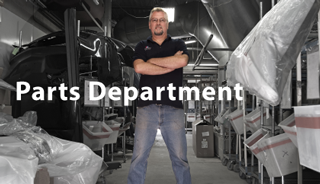
Aftermarket parts come from companies other than the original manufacturer maker who make replacement parts for your car. Aftermarket car parts are generally available the same or next day.
"LKQ" is an acronym for Like, Kind & Quality.
It is another name for used OEM parts. LKQ are also known as used, salvage, or recycled parts.
OEM (Original Equipment Manufacturer) means that same company that built it; Ford, Honda, Acura, Toyota, etc, manufactures replacement parts for your car
OEM parts are distributed through local dealers. Because of the distribution chain established by automobile manufacturers, parts are sold through car dealers, not shipped from the manufacturing plants directly to the end user. Selling them through dealers allows local inventory to exist which means faster access to most parts than having to wait to get them all from a couple of factories around the country.
Domestic and Japanese parts are generally available the same or next day. European and other Asian manufacturers generally take 3 to 5 days depending upon the manufacturer and dealer inventory.
Unlike other facilities that may not be completely honest with you in order to capture your car repair, we give you accurate information based upon real circumstance, and our experience, so you can plan accordingly.
Salvaged Parts are parts that have been harvested from vehicles in salvage yards, or from a total loss vehicle. They may be an OE part or imitation part.
A “lean production facility," a single piece flow process based on the Toyota Production System. Leancontinuously improves the overall collision repair, claims handling experience for all stakeholders by applying ‘Toyota Production System’ principles to shortening down time, reducing cost, and eliminating rework.
"Lean production is not just a collection of good tools like 'repair blueprinting' or 'team work'. It is a major cultural change that demands all the commitment and energy an organization has in order to be successful."
Lean involves keeping the product (vehicle) busy, not the people.
By completing each step in the process error free, an uninterrupted “flow” is maintained. Our Process Management is built upon the fundamentals of Lean Manufacturing where everything happens in the ‘Right Place’ at the ‘Right Time’.
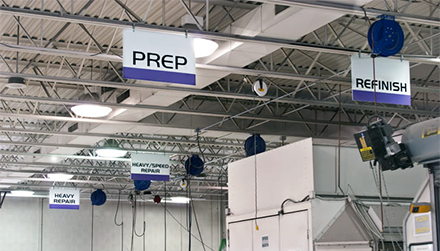
More information about 'Lean Manufacturing' is available at Wikipedia
Lean Teamwork is about developing individuals through team problem-solving.
The idea is to develop and engage people through their contribution to team performance.
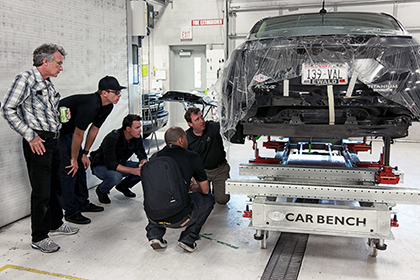
The true “value-focused” process of a repair will start with blueprinting not with an estimate.
Blueprinting is a complete evaluation of all the damages to the vehicle before the repair begins. It consists of the complete tear-down of the vehicle where we are able to assess all of the damage and to determine and order all parts needed for the repair and to obtain any of the necessary before the car moves into a non-stop production process – which is an element of lean.
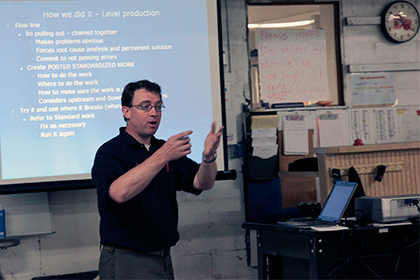
© Copyright 1978-2023. Marshall Auto Body | All rights reserved.
22300 W Bluemound Road Waukesha,
WI 53186 |
262-549-4300